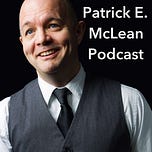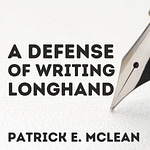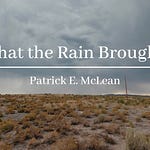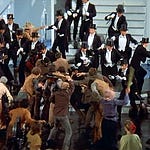It often feels like we live in a time of horrible leadership. Just across the board. Everybody in power seems to be frighteningly old and since the last 40 or so years have been so easy, none of the people in charge of anything have dealt with a real crisis. Or had to build anything. They tear down, they criticize, they pass the buck and grift their way through, with seemingly no awareness that the stakes might be real and far more important than any one person's advantage.
Many of the characters in How to Succeed in Evil are predicated on this kind of idea. People have great potential and power, but they are stupid about using it. Even stupid about doing the wrong things with it.
As I returned to How to Succeed in Evil, I consciously tried to turn away from current events. These stories are meant to be an escape and enjoyment, rather than any ill-advised attempt to reform anything about the world. Because entertainment is a noble thing in its own right. Everybody needs a break.
But here we are. Perhaps it's an unavoidable theme in this moment. I can't even read ancient books without running into it.
BUT FIRST, A THEORY OF CONSCIOUSNESS?
The craziest book I've read in the last year is The Origins of Consciousness in the Breakdown of the Bicameral Mind by Julian Jaynes. And he argues that before some point, the executive functions of our brain were opaque to us -- and appeared to us as voices or gods commanding us to act.
And this was because (loosely speaking) the left side of the brain tends to deal with routine situations and the right side of the brain deals with more novel situations. And if there's a wall between them -- if they are in separate chambers as the term bicameral literally means, then when faced with something novel, the only way the right side of the brain could get through to us in waking hours, was a hallucination. And Jaynes makes the argument that this is how it worked and very much the way schizophrenics and people with specific kinds of brain damage experience the world today.
None of these claims are nuts to me. At one point we, as a species didn't have consciousness -- we weren't aware we were going to die and of the problems that created for us on multiple levels and on multiple time frames -- and at some point, we woke up.
But here's where it becomes audacious. Jaynes claims that you can see this split in ancient literature. Running like a fault line into works that are before consciousness and works that are after.
Before this split, there was no interior sense of self, consciousness, or agency in the way we'd think of it. No lying or deception. The Epic of Gilgamesh is totally like this.
And after this split, people are conflicted. They become liars and aware that other people can be liars. And the nice thing about this theory is that it explains, in the Iliad, why the Gods are the primary motive forces. The book -- more properly, a poem -- doesn't have men and women reflecting on events and deciding what to do, but gods and goddesses visiting them and making decisions for them. I'll provide some examples in a moment.
This leads to all kinds of crazy lines of thought. Because without intent, is ever killing in the Iliad a kind of 2nd-degree murder. There can't be premeditation because there's no meditation. You know, if you don't look at the Trojan war as war in the story, which it absolutely is.
But here's the crazy part -- Jaynes argues that this fault line of consciousness runs right between the Iliad and the Odyssey. This is a crazy idea and I love it. And he seems to make a pretty good case for it. But to really evaluate it I think you have to be an expert in Ancient Greek, neuroscience, psychology, and consciousness. And people like that are very scarce on the ground. Especially because we know effectively nothing about consciousness.
But as a writer, I don't care if it's true. I care if it's USEFUL. If it's productive of more ideas. If I can use this theory as a lens to increase my understanding. And oh boy, does it ever.
As I came back to How to Succeed in Evil, I was more conscious than ever that characters can be representations of different aspects of the psyche. This started off pretty obviously in How to Succeed in Evil. Sloppily speaking, Topper is the Id. Agnes is the Ego. Edwin is the Superego. At least in the original book. Part of my challenge for writing more was to add depth and challenge to these characters.
So I decided to re-read the Iliad through the lens of each character being an aspect of personality. And also to see how well Jaynes' theory fits the story from my, admittedly, uninformed perspective. When I did, something amazing happened. And it illustrates the rewards of giving time and attention to great literature. Let me show you:
In my memory, the Iliad is the story of Achilles' anger. I mean, it's certainly a war story. But that's the external plot. But what makes a story powerful is the internal story. A contemporary and simple example of this is Jaws. The external story is that the sheriff must defeat the shark to keep the town safe. The internal story is that the sheriff must defeat his fear of the water. And that's what makes him heroic in our eyes.
And the reason it's easy to think of the Iliad as the story of Achilles' rage is that's the way it starts. The first chapter is entitled "The Rage of Achilles" and the first line -- the traditional invocation of the muse is
> Rage goddess, sing the rage of Peleus' son Achilles, murderous, doomed, that cost the Achaeans countless losses, hurling down to the house of death so many sturdy souls.
Okay, so, cautionary tale about the destructive perils of rage. That's a theme that's never going to go out of style. But, why is he so angry? He's angry because Agamemnon, the leader of the Greeks, is a worthless leader.
> Many a brave soul did it (Achilles' anger) send hurrying down to Hades, and many a hero did it yield a prey to dogs and vultures, for so were the counsels of Jove fulfilled from the day on which the son of Atreus, king of men, and great Achilles, first fell out with one another.
Even in the explanation, Jove -- Zeus -- Jupiter -- is the force driving the whole thing. Son of Atreus king of Men is Agamemnon.
So, at the beginning of the story, which starts in the middle of the war, a plague has descended upon the camp. People are dropping like flies. Homer represents this as the god Apollo striking them down with his arrows.
> He cut them down in droves and the corpse-fires burned on, night and day, no end in sight.
This goes on for nine days. And finally, Achilles can't take it anymore. He calls together the men and says, we're going to lose the war if this keeps up. But before we give up, we should ask a priest. So they do. And, reluctantly, because the priest is well aware of what a jackass Agamemnon is, he tells them that Apollo is unhappy because Agamemnon won't give up a girl he's taken as a slave. But if he gives the girl back to her father, the plague will stop. So, what does Agamemnon do?
What would you do? I mean besides not trying to sack Troy or taking a girl as a slave in the first place. As a good leader, what would you do?
I'd said, "Great. Here's the girl. Spare my men." This concern for the troops is what motivates Achilles to go to the priest. Right? It's the most important thing. Everybody can see that. Except for Agamemnon who goes off on the priest.
Seer of misery! Never a word that works to my advantage!
Always misery warms your heart, your prophecies --
never a word of profit said or brought to pass.
Now, again you divine god's will for the armies,
bruit it about, as fact, why the deadly Archer
multiplies our pains: because I, I refused
that glittering price for the young girl Chryseis
Indeed I prefer her by far, the girl herself,
I want her mine in my own house! I rank her higher
than Clytemnestra, my wedded wife -- she's nothing less
in build or breeding, in mind or works of hand.
Now don't get distracted by the fact that the name Clytemnestra sounds like a cross between a venereal disease and a banned food additive. Stay with Agamemnon. Notice how he is bitter, petty, and all about him. And he takes eleven lines before he gets to the most important thing.
But I am willing to give her back, even so,
if that is best for all. What I really want
is to keep my people safe, not see them dying.
The Iliad is manifestly the wrong book for not seeing people dying. And clearly, _he_ could have asked the priest what was up. But he didn't. But here's the telling point.
But fetch me another prize, and straight off too,
else I alone of the Argives go without my honor.
That would be disgrace. You are all witness,
look -- my prize is snatched away.
Which isn't even correct in the story. Because the girl's father came to buy his daughter back from Agamemnon. The dude is just being arrogant and prideful. And there's a word for that in Ancient Greek. Hubris.
So anyway, because Achilles stands up to him, Agamemnon takes Achilles' slave girl. At that moment Achilles goes for his sword, but Athena appears to him -- a hallucination of the executive function of the brain stepping in as per our theory -- and convinces him not to fight Agamemnon. But he's so upset about the loss of his slave girl that he decides to go on strike and sit out the war. And he takes the best troops with him.
Because of bad leadership, the most competent warrior refuses to fight. In essence, he resigns.
Does any of this seem at all familiar or at least analogous?
Now, you could say that Agamemnon is just having a bad day. Or a bad moment. Or maybe he just doesn't get along with Achilles, who we can also see as a kind of prima-donna. In book 11 -- Agamemnon's Day of Glory -- he rides out and cuts people down like grass, until, he gets a cut on his forearm and he leaves the field. Not as heroic as he could be. Now Agamemnon is not elected in any sense of the word, but the text seems pretty clear to me that he has his power because he has the relationships with all the coalition members. How good these relationships are?
So when Agamemnon goes home to get a band-aid, the Trojans rally and it looks like the Greeks are going to be routed -- driven back into the sea. But Odysseus and Diomedes rally the men and keep it from being a complete loss. But this read far from glory for Agamemnon.
From that point in the book, the Greeks take a pretty straight beating from then in. And it gets so bad, that at one point, Agamemnon, says, "Maybe we should take a couple of ships and row out to sea, wait until dark and come back and collect everybody who has survived and then go home." Which is a horrible idea. And Odysseus, the most cunning of them, all unleashes this speech.
With a dark glance, the shrewd tactician Odysseus
Wheeled on his commander. "What's this, Atrides,
this talk that slips from your clenched teeth?
You are the disaster.
Would to god you commanded another army.
What if one of the men gets wind of your brave plan?
No one should ever let such nonsense pass his lips
no one with any skill in fit and proper speech--
and least of all yourself, a sceptered king.
Full battalions hang on your words Agamemnon
Achean troops will never hold the line, I tell you.
not while the long ships are being hauled to sea.
They'll look left and right -- for where can they run?
and they'll fling their lust for battle to the winds. Then,
Commander of armies, your plan will kill us all."
At that the King of men Agamemnon backed down.
Yeah, he did.
The war goes on and it gets worse fro Greeks. All the Greek heroes are knocked out of commission either dead or wounded, and it looks like the end. But Achilles is so pissed he still won't help
So Patroclus, Achilles' best friend goes to him and begs -- not for Achilles to re-enter the fray, but for Achilles lend him his armor and lead his troops the Myrmidons (who are fresh because they've been resting this whole time) out into battle. One sharp shock will turn the tide and everybody fears Achilles.
But Patroclus, though brave, is no great warrior. Hector rides out and kills him. Achilles goes out and weeps over his friend's dead body. And then at dawn Achilles mother - a goddess -- brings him a new, even more, magnificent suit of armor hot off Vulcan's forge.
Agamemnon finally gives him his girl back. Achilles hops on his chariot ready to ready to go to war. And there's this little moment. He pats his horse and praises them, reminds them of the lineage they come from, and tells them to do a good job. It's human and recognizable. The kind of thing you'd see in a cowboy movie.
Except that one of his horses _talks back_ saying, basically, "Man, I'ma do my best, but you better get right with the fact that you gonna die on this windy plain of Troy." It couldn't be any weirder if Hunter S. Thompson wrote it.
And Achilles, cause he's such a badass says,
Don't waste your breath.
I know, well I know --
I am destined to die here, far from my dear father,
far from mother. But all the same, I will never stop
til I drive the Trojans to their bloody fill of war.
Then he yells "eeYeah!" whips the horse into action and goes off to kill, well, everybody.
Now, before we get to the climax, it's important to recognize how out of control this war gets. Diomedes, a Greek, tries to kill love. He wounds a goddess, Aphrodite. Like, I understand heartbreak, and I understand anger. But I've never wanted to KILL love.
And then he turns right around and spears the GOD of WAR through the stomach, forcing him to leave the field. Diomedes is a badass and he gets very little press. And as much of a badass as Diomedes is, he's not the fiercest warrior in the story. That's Achilles, who now uncorks his entire can of whoop-ass. Ultimately he kills Hector, the Trojan's most valiant warrior, and drags his corpse around the city behind his chariot.
The war doesn't end in the Iliad. The book ends with Hector's funeral. But the feeling among the Trojans is that the war is lost. That great stuff about the Trojan horse we actually get from Virgil, a Roman poet who wrote much later, in the Aeneid.
FINALLY BRINGING IT ALL HOME
So with all of that as an explanation -- and forgive me if I got a little carried away, but it's a great story. Let me finally get to my point and bring this whole thing home.
A great work of art can be read in many different ways. And all of them are profitable. That's what makes the Canon the canon. The works are deep, almost beyond belief. To me, it appears that the modern-day humanities have abandoned this understanding in the pursuit of social justice. And it's not that the impulse towards justice is wrong -- it's that they have thrown the baby out with the bathwater.
Of course, there is the crass stupidity of dismissing Homer as an old dead white guy. Homer was, at best, just the guy who wrote the story down, but he seems to be just a representation of a very long tradition of oral poets who come from a culture alien to ours. And if you believe Julian Jaynes, not even, for much of their history, possessing what we think of as interior consciousness.
But this very alien quality -- and the unbelievable intellectual flourishing of Greece before the Peloponnesian war -- are what make this culture worth studying. Because they were human and brilliant and highly successful, but totally different from us. It's like the benefits of travel. I don't think people are fundamentally different anywhere you go. But if you only stay in one place or culture, what you think of as fundamentally human, is very narrow. But the farther you range in your travels and you're reading, the more of what is really, truly fundamental, important and beautiful about being human is revealed.
So here's what I take from my last psychological reading of the Iliad.
Agamemnon is a venial and corrupt leader. Achilles is the height of competence, but and because of the corruption of the political structure, he refuses to play the game. And what's more, he's absolutely right about the leadership being terrible. There are other competent actors, more responsible and mature actors among the Greeks -- Diomedes, Odysseus, and others -- who stay in the game, but ultimately, the only way to victory -- a victory that can't be had without paying a terrible price -- is for everybody to get over themselves, put their ego's aside, and do their best.
The Iliad is not romantic about war. Everybody suffers and loses horribly. It reads quite fatalistically to me. Wars happen because the gods toy with us. And whatever you might think of Julian Jaynes theory of the development of consciousness -- I bet when you're in a war, that's exactly what it feels like -- the gods toying with you.
The quotes are from the Robert Fagles translation of the Iliad -- which I like very much. He's clean and fast and readable preserving the adventure story quality in his translations of the Odyssey, the Iliad, and the Aeneid. And you can get a Kindle edition of the Iliad for, I kid you not, .60 cents. Can you even get a soda out of a soda machine for that anymore? Go buy it. You're swimming in Western Culture, might as well take a few pains to understand it.
Emily Wilson's translation of the Odyssey is also really good. And she's working on a translation of the Iliad. But if you've the impulse to dip into the Illiad Maybe don't wait.
Because right now it feels like the gods are toying with us all, all the time.














Share this post